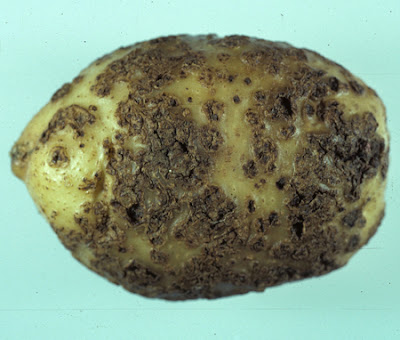Scab
 <potato scab>
<potato scab>I found myself following a car this morning with countless bumper stickers plastered all over its trunk. They left no doubt that the owner of the car was a young, athletic person.
My eyes focused on one sticker in particular: Scab Skateboard. Aside from being a great in-your-face brand name for a skateboard, the word scab caught my eye, and I decided to pursue its origin when I got home.
Most of us think of it as the crusty protection that forms over a scrape or wound--nature’s own bandage. But the word started its career in 1250 as the name for a disease of the skin in which pustules or scales are formed. Take my word for it: the medical illustrations are disgusting.
It was also a disease in animals resembling mange, a condition characterized by itching, lesions, and loss of hair. [Mange comes from a word meaning to eat. In Latin, it was not unusual for the same word to mean both itching and eating, probably from the analogy that an itch gnaws away at your skin.] Not to be limited in its scope, the word scab was also applied to plant diseases. It caused scab-like roughness on vegetable surfaces, like the hapless potato pictured above.
The word was also used as an epithet referring to a scoundral or scurrilous person. And, of course, in labor history it was applied to someone who refused to join a strike or who took the place of a striking worker.
Around 1529, it took on theological dimensions, being used to describe a moral or spiritual disease. A great quote in this regard comes from one G. Herbert: “The itch of disputing is the scab of the church.” Amen to that, brother.
Scabies is an allied word, as are scabious, scabrate, scabridity, scabriusculous, scabrosity, scabrous, and the highly picturesque scabland, an elevated area of barren rocky land with little or no soil cover, deeply scarred by channels of ancient glacial streams.
Scabbard--a sheath that protects the blade of a sword or knife--is not connected.
SIDEBAR: Scabies fact sheet


Comments